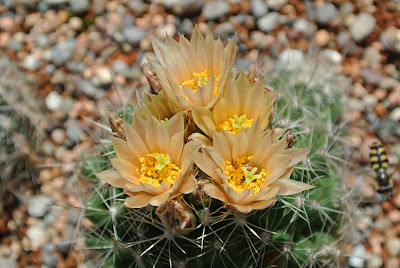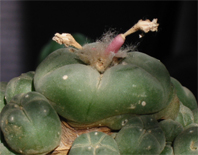
Escobaria vivipara with a light snow cover
I’m fascinated by the ability of certain cacti species to survive even quite extreme freezing conditions. A fascination that is probably rooted in my childhood belief that all cacti were heat craving desert dwellers that would succumb to subfreezing temperatures - great was my surprise the first time I saw pictures of a cactus covered in snow.

Echinocereus triglochidiatus var. mojavensis sprinkled with snow
I live in a condominium and the only possibility for pursuing my interest in growing frost tolerant cacti outdoors - apart from the bed of winter-hardy cacti at my summerhouse - is to grow cacti in flower boxes on the balcony.
For several years I have successfully grown Echinocereus triglochidiatus (claret cup hedgehog cactus) outdoors (year-round) at my summerhouse in the northwestern part of Denmark - inspired by this I acquired a few E. triglochidiatus var. mojavensis (DJF1273; North of Inyo County, California) plants for my flower boxes a couple of years ago and they are also doing great.

Escobaria missouriensis in the snow
The well-being of the Escobaria species are of greater concern to me. The Botanical Garden of Copenhagen attempted growing Escobaria in their outdoor cactus bed but they all perished. My plants still seem to be weathering it out here in Copenhagen but I’m concerned that the continuous frost-thaw cycles will expose the plants to killing moisture.
Denmark has been frost-bound for several weeks now with the plants seeing temperatures as low as -10 C (14 F) (this is nothing for Escobaria vivipara which is known to have survived extreme temperatures as low as -35 degrees C) but the frost now loosens its grip again and it has started to rain, soaking the flower boxes that are still frozen solid. I hope that the light shelter provided by the balcony on the floor above will keep the plants from getting too wet - if not, I reckon the rot will soon show in the coming period of relatively warm and humid weather.
The beehive cactus species I’m growing in flower boxes on the balcony are Escobaria vivipara (Alberta, Canada) and Escobaria missouriensis (Mesa County, Colorado; SB204)

Flower box with Escobaria and Echinocereus cacti in the snow
This coming season I plan to grow peyote cactus in outdoor window boxes as well - but I don’t expect peyote to cope well with the Danish winter so the plants will need to be wintered in the attic.
Below are a few pictures of the balcony grown Escobaria plants during summer - what a happy flowering bunch :-)

Flowering Escobaria vivipara (Alberta, Canada)

Flowering Escobaria missouriensis (Mesa County, Colorado; SB204)
In relation to the two above images, the previous post featured a high-speed video showing the flower fly hovering above the Escobaria vivipara cactus.
Mitteilungen der Deutschen dendrologischen gesellschaft. 1924 (added:
01/12/2026)
-
*By:*
Deutsche Dendrologische Gesellschaft
*Publication Info:*
Wendisch-Wilmersdorf; [etc.] Thyrow (Kr. Teltow), [etc.]
*Call Number:*
QK1 .D49
*Contributing...
2 weeks ago



















These cold-hardy cacti are amazing aren't they. Interesting, I have some Escobaria Vivipara grafted on pereskiopsis right now..Hopes were that I could eventually de-graft them and plant them outside..So I could grow cacti outdoors year round! Love your blog, keep up the good work. Here is a link to my new cacti blog.
ReplyDeletehttp://how-to-grow-cactus.blogspot.com/
Escobaria vivipara is indeed an interesting and beautiful species of cactus. Happy growing and good luck with your blog.
DeleteMy Echinocereus Viridiflorus, which are grafted on pereskiopsis, are becoming deformed; splitting their heads, forming new heads and the like..Have you ever experienced this? Also, do you have any favorite seed suppliers? Your collection features many species that I haven't been able to get seeds for. Thanks and love your blog once again.
ReplyDeleteGrafted cacti are typically more inclined to set offshoots - and some more than others :-) I once had a grafted Pelecyphora aselliformis that branched like crazy; your Echinocereus viridiflorus seems to be in the same class of freely "tillering" plants. Regarding seeds, check out http://www.cactus-hobby.eu/ for a broad selection.
Delete.